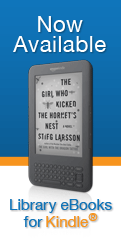
Library patrons will soon be able to borrow Kindle books from more than 11,000 libraries in the United States to read on any generation Kindle device, free Kindle app, or in their browser with Kindle Cloud Reader. Public library books for Kindle provide the same unique features as Kindle and Kindle books, including Whispersync technology that synchronizes notes, highlights and last page read, real page numbers, and more. Books are downloaded over Wi-Fi or USB, but 3G will not be supported.
From Amazon’s new “Public Library Books for Kindle” instructional page the service is described as follows:
-Visit the website of a U.S. library that offers digital services from OverDrive.
-Check out a Kindle book (library card required).
-Click on “Get for Kindle.” You will then be directed to Amazon.com to redeem your public library loan.
-You may be required to login to your Amazon.com account — or create a new account — if you’re not already logged in.
-Choose to read the book on your Kindle device, free reading app, or Kindle Cloud Reader

